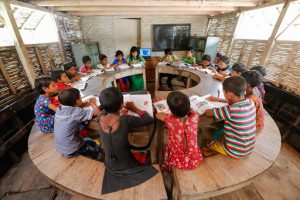This blog post is written by Dr Alessandro Massazza, United for Global Mental Health, and Dr Omnia El Omrani, Climate Cares Centre, Imperial College London.

No country is sufficiently protecting children and young people’s health, their environment and their futures. Young people under 24 make up 41% of all people alive today. Among them, 89% live in low- and middle-income countries that are particularly vulnerable to the impacts of climate change. According to Save the Children, a child born in 2020 will be exposed to seven times the number of heatwaves as their grandparents, even if the emission reduction targets set by the 2015 Paris Agreement are met.
As a result, children’s physical and mental health is being disproportionately affected by climate change. The 2022 IPCC report indicated there is very high confidence that climate change has already negatively impacted mental health globally, with children and young people identified as populations at higher risk.
Extreme weather events can negatively impact children’s mental health by exposing them to potentially traumatic events such as the death of loved ones and serious injury, as well as by negatively impacting determinants of mental health such as increasing levels of food insecurity, causing family separation during crises, increasing the risk of violence against children, or leading to school closures. In Australia, a recent UNICEF report highlighted that more than 1.4 million Australian children and young people experience at least one climate disaster or extreme weather event every year. That is equivalent to one in six children, and that number is on the rise.
Increasing global temperatures and extreme heat are also impacting children’s mental health as more and more children are being exposed to extreme temperatures. Extreme heat exposes children to chronic levels of stress, disrupting sleep and increasing domestic violence. The perinatal period is particularly affected by extreme heat resulting in obstetric complications, and potentially impacting children’s emotional and cognitive development. For example, In recent months, multiple countries from South Sudan to the Philippines were forced to impose school closures due to extreme temperatures, with potential negative consequences on the mental health of children.
Finally, children’s mental health and wellbeing are being negatively affected as young generations grapple with the perception of climate change as an existential threat. Children around the world have been found to be experiencing a range of uncomfortable emotions concerning climate change variously described as climate anxiety, climate distress, or eco-anxiety. One study of 10,000 children and young people across 10 countries found that 59% of participants were very or extremely worried about climate change and 45% of participants reported that their feelings about climate change negatively affected their daily life and functioning. Although these reactions may be experienced as distressing and may act as a stressor that can worsen mental health, it’s important to highlight that in most cases they are adaptive responses to climate change and should not in themselves be pathologized.

Given the growing evidence on the impacts of climate change on children’s mental health, it is paramount that mental health is prioritised in discussions on children and climate change. For the first time, the Subsidiary Body for Implementation (SBI) of the United Nations Framework Convention on Climate Change (UNFCCC) has been tasked with holding an expert dialogue on the disproportionate impacts of climate change on children to identify appropriate child-responsive policy solutions.
The Climate Cares Centre at Imperial College London has joined forces with United for Global Mental Health with support from partners of the Global Mental Health Action Network from Brazil and Azerbaijan, to call for children’s mental health to be central in this dialogue.
You can find the full submission linked on this page.
Recommendations
As part of this submission, we make a specific set of recommendations across three areas including mental health support for children in the context of climate adaptation, integration of mental health into the Glasgow Work Programme on Action for Climate Empowerment (ACE), and ensuring the meaningful participation of children in the expert dialogue.
- First, we are calling for mental health support for children to be provided in the context of climate adaptation efforts. According to the 2022 IPCC AR6 report, improving access to mental healthcare is considered a form of effective adaptation (see C.3.7). It is imperative that special consideration is given to children given the foundational nature of this period for mental health across the life course. Discussing access and scale-up of frameworks and finance to build the climate resilience of child-responsive mental health services in adaptation planning and disaster preparedness interventions is critical to effectively protect children from immediate distress and anxiety while mitigating the long-term mental health consequences resulting from exposure to extreme climate events.
- Secondly, we are calling for mental health considerations to be integrated within the Glasgow work programme on Action for Climate Empowerment (ACE). The overarching goal of ACE is to empower all members of society to engage in climate action, through climate change education and public awareness, training, public participation, public access to information, and international cooperation on these issues. It is fundamental for mental health to be considered when conducting this work with children, to ensure they feel equipped to engage in climate action as appropriate and their mental health is protected and safeguarded.
- Thirdly, we call for meaningful participation within the expert dialogue of children, particularly children with lived experience of mental health challenges in the context of climate change. Young people should be given the space to self-advocate for their mental health and drive the change they want to see in mental health at the national and global levels. It is of utmost importance to support and advance the work led by the official youth and children constituency of the UNFCCC (YOUNGO) and engage the COP29 Presidency Youth Climate Champion, Ms Leyla Hasanova, within the expert dialogue, given the potential of this role to mobilise support for ACE implementation, especially for children.
The expert dialogue on children and climate change taking part at the SB60 climate meeting in Bonn represents a key opportunity to advocate for children’s mental health to be at the heart of discussions on climate change. We call on the UNFCCC to hold a follow-up expert dialogue on children and climate change to provide a timely stocktake on progress and to convene Parties, experts, civil society, people with lived experience, and other stakeholders to strengthen child-responsive actions and initiatives, to ensure that children’s mental health and wellbeing remain at the forefront of our collective efforts.
We hope this will represent the first important step towards ensuring that children’s mental health is integrated as a cross-cutting consideration across policies and actions to respond to climate change.
The healthy psychological development of children represents the foundation of future societies and must be safeguarded at all costs in the face of climate change.